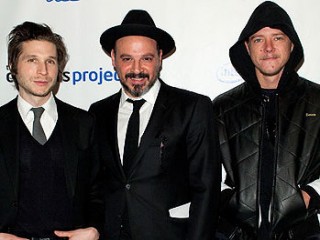
Interpol biography
Date of birth : -
Date of death : -
Birthplace : New York City,U.S.
Nationality : American
Category : Arts and Entertainment
Last modified : 2012-03-26
Credited as : Indie rock band, Our Love to Admire, Lights single
0 votes so far
Paying by the hour, they cultivated a unique aesthetic and developed their notoriously delicate and complicated creative process. In 2000, Greg and the band split leaving Daniel, Paul, and Carlos with a significant and reflective hiatus. It soon came about that Interpol would try out Sam, whom Daniel knew through the record store where Sam worked.
Sam was perfect for the band as he gave Interpol a healthy shot of punk aggression and rhythmic backbone. Now with the line-up revitalized, Interpol resumed gigging at venues like Brownies, Mercury Lounge, and The Bowery Ballroom. Throughout 2000 and 2001 they opened for bands like ...And You Will Know Us By The Trail of Dead, Arab Strap, and The Delgados. Then came Interpol’s first release, at the end of 2000, in the form of the third installment of the FukdID EP series on Scottish label Chemikal Underground. Around the same time, the band also contributed an unreleased track, "Song Seven," to the Fierce Panda Records compilation Clooney Tunes. Popularity abroad increased as a result of regular rotation on London’s XFM.
In April 2001 Interpol played in Glasgow, Manchester, and London, capping off their visit with a session for the famed John Peel. Later on in August and November, the group visited France with appearances at festivals La Route du Rock (St. Malo) and Festival Off (Paris) respectively. In November of 2001, the band tucked themselves away in Connecticut at Tarquin Studios to record their debut full-length. The album was recorded and mixed by Peter Katis (Mercury Rev, Clem Snide) and Gareth Jones (Depeche Mode, Nick Cave & the Bad Seeds, Clinic.)
Matador Records signed the band in early 2002; by the year of the year, the independent label had issued both a three-song single and the band's debut LP, Turn on the Bright Lights. The album turned Interpol into a successful indie rock act, providing further proof that New York City had become a hub of marketable post-punk revivalism in the early 21st century.
Extensive touring followed, including international dates and television appearances. The band also opened for the Cure as part of that band's Curiosa Festival; soon after, Interpol released its second album, 2004's Antics. Three songs entered the Top 40 charts in the U.K., where the record later went gold. Following a major-label upgrade to the roster of Capitol Records, Interpol returned in 2007 with Our Love to Admire. Along with their Interpol duties, the band's members kept busy with other projects: Fogarino joined forces with Swervedriver's Adam Franklin as the Setting Suns (who later changed their name to Magnetic Morning), while Paul Banks embarked on a solo career as Julian Plenti, releasing the 2009 album Julian Plenti Is Skyscraper.
Dengler ventured into writing film scores. The band began recording their fourth album in early 2009, and in spring 2010, it was announced that Dengler was leaving Interpol; around that time, the band self-released the single "Lights." Dave Pajo was announced as the touring bassist for the group's shows with U2 and in Europe that summer. Interpol, which marked the band's return to Matador, arrived in September 2010.
After Interpol's appearance at Reading and Leads in 2011, drummer Sam Fogarino was interviewed. He said, "we need a big break. Interpol needs it. We need to recoup and go on a proper hiatus." He stated that the remaining members of the band would be pursuing separate projects.
Studio albums:
Turn on the Bright Lights (2002)
Antics (2004)
Our Love to Admire (2007)
Interpol (2010)
Current members:
Paul Banks – vocals, guitar (1997–present)
Daniel Kessler – guitar, vocals (1997–present)
Sam Fogarino – drums, percussion (2000–present)


















